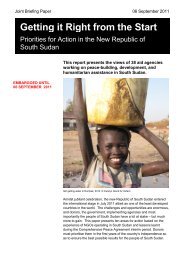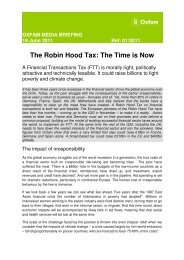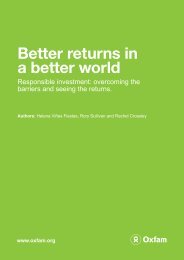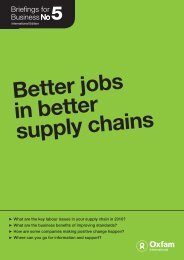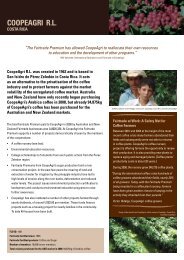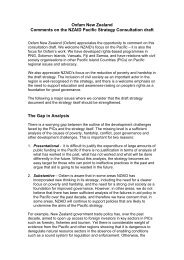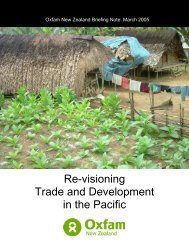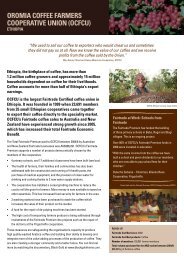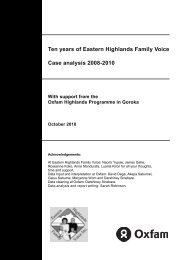Bananas: Unpeeling the Banana Trade - The Fairtrade Foundation
Bananas: Unpeeling the Banana Trade - The Fairtrade Foundation
Bananas: Unpeeling the Banana Trade - The Fairtrade Foundation
Create successful ePaper yourself
Turn your PDF publications into a flip-book with our unique Google optimized e-Paper software.
Higher shipping, distribution and labour costs allcontribute to a much higher overall production cost thanLatin American plantation production. Small farmers arealso less able to respond to increasing demands forstandardised fruit quality and large volumes. More andmore retailers also require technical quality standardssuch as GLOBALGAP 19 from all <strong>the</strong>ir suppliers and smallproducers have limited capital to invest in meeting <strong>the</strong>seneeds. Hurricanes and flooding are frequent in <strong>the</strong>Caribbean. For smallholders, losing a crop to <strong>the</strong> wea<strong>the</strong>rcan be disastrous and it can take several months beforeany fruit can be harvested again. Substantial outlay isrequired to buy more banana plants. Without o<strong>the</strong>r cropsto fall back on, or savings to shoulder <strong>the</strong> extra cost andfeed a family while business is poor, <strong>the</strong> situationis desperate. This too has knock-on effects on <strong>the</strong> localeconomy.<strong>Fairtrade</strong> is unique because at its heartlies <strong>the</strong> need of small-scale producersfor market access under fair tradingconditions. No o<strong>the</strong>r ethical trade initiativeaddresses <strong>the</strong> problems faced byfamily-based producers working at <strong>the</strong> farend of global supply chains over which<strong>the</strong>y have virtually no influence, but inwhich decisions are made that can affect<strong>the</strong>ir whole lives.In Colombia and Ecuador small farmers are treated byexporters as a kind of buffer supply – <strong>the</strong>ir fruit is indemand when <strong>the</strong> market is in short supply; but when <strong>the</strong>market is oversupplied <strong>the</strong>y are forced to accept pricesbelow <strong>the</strong>ir costs of production or are simply unable tosell at all. <strong>The</strong> response of many small growers in SouthAmerica and <strong>the</strong> Caribbean has been to come toge<strong>the</strong>rin associations and co-operatives (which enables <strong>the</strong>m toshare costs, market information and technical support) inorder to supply higher value speciality markets such as <strong>the</strong>organic and/or <strong>Fairtrade</strong> markets. This is a very positivedevelopment, but it has not prevented many thousands ofsmall-scale banana farmers from losing <strong>the</strong>ir livelihoods.In Ecuador, every time <strong>the</strong> price falls below <strong>the</strong> costs ofproduction (as it does for several months of <strong>the</strong> year),ano<strong>the</strong>r raft of small producers goes out of bananaproduction. Whe<strong>the</strong>r in <strong>the</strong> Windwards or South America,<strong>the</strong>re are often few alternatives for farmers to migrating tourban areas or to <strong>the</strong> rich countries where <strong>the</strong>ir bananasare consumed.After decades in which smallholders have beensqueezed out of markets by larger plantations, <strong>the</strong> worldis beginning to wake up to <strong>the</strong> damage this has causedsocially and environmentally. <strong>The</strong> <strong>Fairtrade</strong> modeldemonstrates that small-scale farmers can achievegreater productivity while preserving <strong>the</strong> naturalenvironment and <strong>the</strong> well-being of people working on<strong>the</strong> land, as well as delivering high-quality products.For small-scale farmers to remain economically viable andbenefit from international trade <strong>the</strong>y will need improvedaccess to credit, farm inputs and technical support.4.2 Plantation workers: bearing <strong>the</strong> costsof cheap bananas<strong>The</strong> o<strong>the</strong>r main type of production takes place onmedium- and large-scale plantations that hire labour allyear round. A typical plantation is 250 hectares although<strong>the</strong>y can be as large as 5,000 hectares. <strong>The</strong>y generallyemploy one worker per hectare of commercial bananasalthough in <strong>the</strong> most productive plantations, <strong>the</strong>re maybe as little as one worker per 1.5 hectares. Comparedto o<strong>the</strong>r cash crops however, bananas remain a highlylabour-intensive crop and today over 90% of bananasentering world trade are produced on plantations wherelarge numbers of workers are present.Most of <strong>the</strong> Latin America industry is characterised bylarge-scale plantations, many owned by US companies(hence <strong>the</strong> name ‘dollar’ bananas), on flat coastal lands.In many countries <strong>the</strong> plantations are controlled ei<strong>the</strong>r by<strong>the</strong> big multinationals with ‘vertically integrated’ operations(from plantation ownership to importing and ripeningfacilities in <strong>the</strong> consumer countries), or by nationalcompanies that sell to <strong>the</strong> same multinationals.<strong>Fairtrade</strong> also has a wider ambition toassist all people who are disadvantaged byconventional trade, and landless labourersare among those in greatest need of ourmodel. We will ensure that our work withplantations complements o<strong>the</strong>r initiativesseeking to secure and enhance labourrights in <strong>the</strong> global South.Given that <strong>the</strong> vast majority of banana trade is suppliedby plantations and that it has been a very profitable cropfor fruit companies and retailers, it would be reasonableto expect that <strong>the</strong> benefits might be shared with <strong>the</strong> half amillion or so workers in <strong>the</strong> world’s banana plantations.19GLOBALGAP standards certify Good Agricultural Practice as required by European retailers.page 7 <strong>Unpeeling</strong> <strong>the</strong> banana trade



